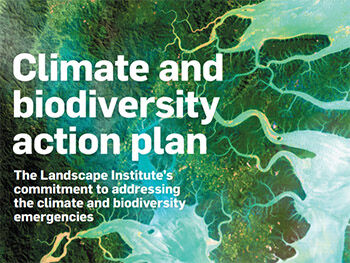Researcher helps tackle climate crisis in global action plan

A Birmingham City University researcher has helped contribute to the Landscape Institute (LI)’s action plan to tackle the global biodiversity and climate crisis.
Helping to reach net zero
Anastasia Nikologianni, a researcher based within the University’s Critical Artistic Thinking in Design (CATiD) research hub, has provided valuable expertise to the LI’s Climate and Biodiversity Action Plan.
The document, released in May 2020, outlines the LI’s ambitions to reduce its carbon footprint to net zero – achieving a balance between emissions produced and emissions taken out of the atmosphere – by the end of 2029.
“This is just the beginning,” Anastasia says. “The action plan shows the significance of the problem. It demonstrates real measures and aims to use all means within the LI scope to respond to the climate and biodiversity emergencies.”
Sustainability expertise
Anastasia became part of the LI’s Climate Crisis and Biodiversity Panel in 2019, alongside sustainability experts researching ways to address the climate crisis.
“During the several months leading to the publication of the action plan, as panel members we were required to identify key areas, collaborate on workshops to highlight specific areas of work, review documents and create a vision for this endeavour,” Anastasia explains.
Helping address the climate crisis
The LI outline a number of commitments in the action plan, including:
- Working with governments and industry for measures to address the crisis;
- Regulating and monitoring the sector to encourage greater sustainability;
- Equipping the profession to provide solutions;
- Helping businesses and other industries reach net zero.
“The sky is the limit,” Anastasia enthuses. “There are so many actions we can do, and that in a way was a significant part of our discussions within the panel. As we are all keen to make this work we have identified key actions that we'll work towards and hopefully more will come in the near future.”
At the forefront of research
Anastasia’s research focuses around sustainability and the climate crisis, making her an ideal candidate to make a contribution. She believes involvement with leading organisations such as LI is a positive thing for both herself, CATiD and the University.
“I am always keen to be involved with professional bodies that aim to support practice and produce innovative guidance,” Anastasia says. “It also allows CATiD to remain up to date with real-life challenges that produce applicable research and designs.
“Having a document that leads the way to a net zero carbon lifestyle, not only for individuals but for businesses, can perhaps be the predecessor of a policy document in the same field. This will put us at the front of the research and the discussions being held.”